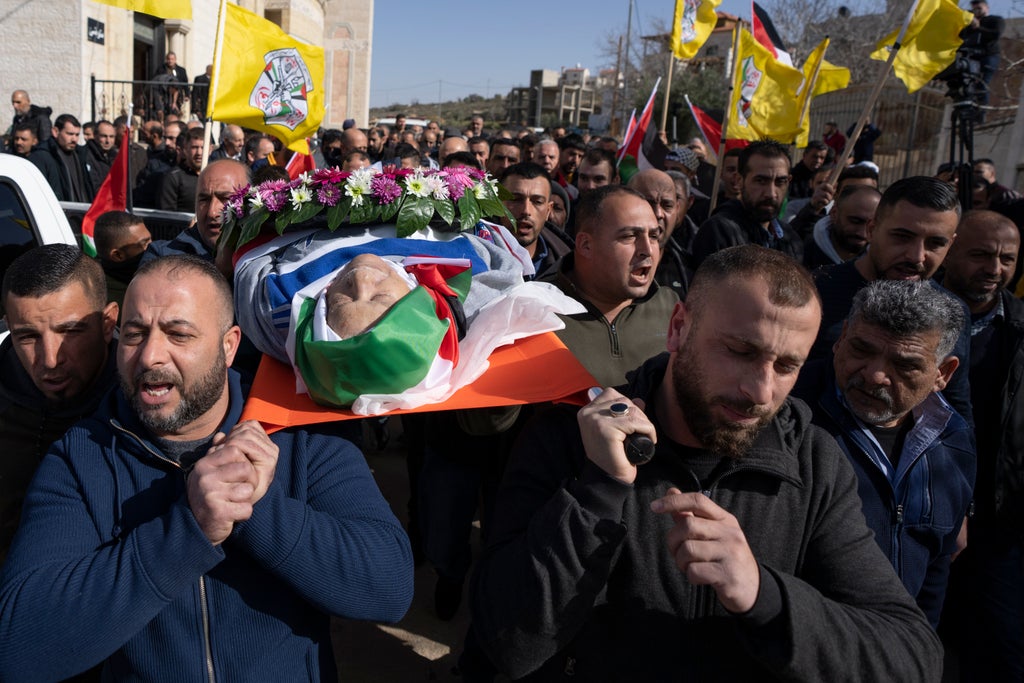
Two members of Wisconsin's congressional delegation asked the Biden administration Monday to investigate how a Palestinian-American who lived in Milwaukee before moving back to his home village died at a West Bank checkpoint.
Omar Assad, 78, died after Israeli troops stopped him at a checkpoint in his native village of Jiljilya during the early morning hours of Jan. 12, according to family members and media reports.
Assad's nephew, Assad Assad, said others who were detained at the checkpoint told family members that the soldiers dragged Assad out of his car, threw him to the ground and shackled his hands and feet with zip ties, then fled after he died on the spot.
The Israeli military has said Omar was detained after resisting an inspection and later released, implying he was alive. It’s unclear exactly when he died. An autopsy performed by Palestinian doctors that became public on Thursday determined the cause of death was a heart attack brought on by “external violence.”
Lt. Col. Amnon Shefler, an Israeli military spokesman, said Assad's death remains under investigation and that “actions will be taken if wrongdoing is found.”
Assad was born in Jiljilya but spent about 40 years in the United States He became a U.S. citizen before he returned to his home village in 2009 to retire with his wife, Nazmia, his nephew told The Associated Press.
U.S. State Department officials have said they're seeking clarification about the events leading up to Assad's death.
U.S. Sen. Tammy Baldwin and Rep. Gwen Moore sent a letter to U.S. Secretary of State Antony Blinken asking him to launch an investigation into Assad's death and whether the soldiers involved used equipment procured with American aid.
“We strongly support human rights and the rule of law as the foundation of United States foreign policy,” Baldwin and Moore wrote. “As a Palestinian American, Mr. Assad deserves the full protections afforded U.S. citizens living abroad and his family deserves answers.”
State Department spokesman Ned Price said Monday that he hadn't seen the request from Baldwin and Moore and the agency hasn't seen a final report from Israeli officials.
“We continue to support an investigation that is thorough and comprehensive into the circumstances of the incident and we welcome receiving additional information as soon as possible,” Price said.
Israel has occupied the West Bank since the Six Day War in 1967. Assad Assad said his uncle and aunt left Jiljilya for Chicago in 1969 in hopes of finding jobs. They moved to Milwaukee in 1974 and prospered, opening convenience stores and a restaurant, he said.
They were among dozens of Jiljilya residents who have returned to the village over the years to build retirement homes, Assad Assad said.
“They built mini-castles to retire in,” he said. “Very quiet, all you see is olive trees. At night, because we’re high in the mountains, you smell the orchards of oranges.”
Omar Assad's nephew and his son, Hane Assad, both described Omar as a philanthropist who was the life of the party. Hane Assad told the AP his father would often hand out money to the poor.
“He just loved everybody, no matter what race you were, what culture you came from,” he said. “He just saw you as a human being.”
His favorite pastimes were eating — his favorite dish was maqluba, a mix of rice and meat — and playing cards, Assad Assad said. He was coming home from playing cards with a cousin when the soldiers stopped him, he said.
Hane Assad said his mother and father were set to visit him at his home in Chesapeake, Virginia, before his father died. The family is frustrated by a lack of clear answers from the Israeli military, although they don't expect any. Assad said his father was too old and weak to fight anyone, let alone a group of soldiers.
“He was very weak,” Hane Assad said. “He walked with a cane. It takes him five minutes to get to the car, the way he walks. He doesn’t have the power of 30 soldiers . . . The military said ‘we left and he was fine.’ It doesn’t make sense."
Assad said he's always afraid when he returns to Jiljilya because the Israelis who operate the checkpoints are rude and disrespectful. He said he was once detained for four hours on the way to his grandmother's funeral. The troops laugh at his American citizenship, he said.
“Every time we got stopped Dad would say ‘whatever they ask for give it to them. Just be calm.’ Plenty of times we got pulled over and I never saw him fight," Hane Assad said. “I can’t believe they did that to my dad. Almost an 80-year-old man. All the soldiers there couldn’t handle him? This is uncalled for. You don't treat no elderly person like that.”







